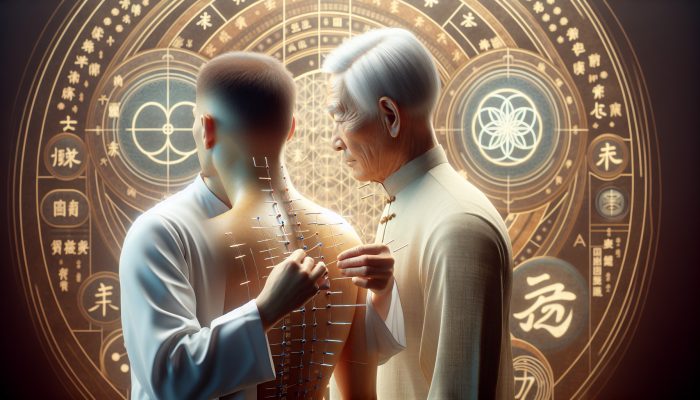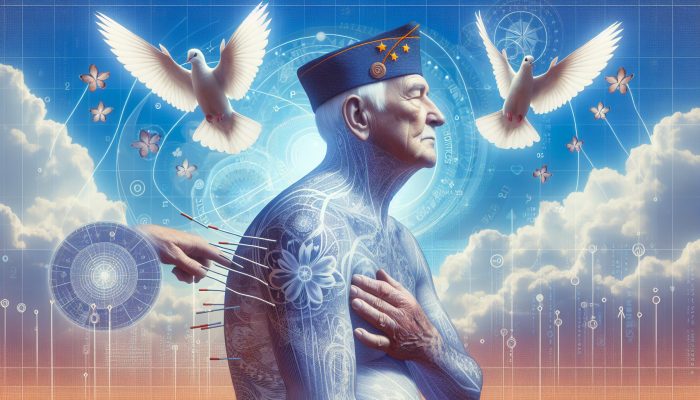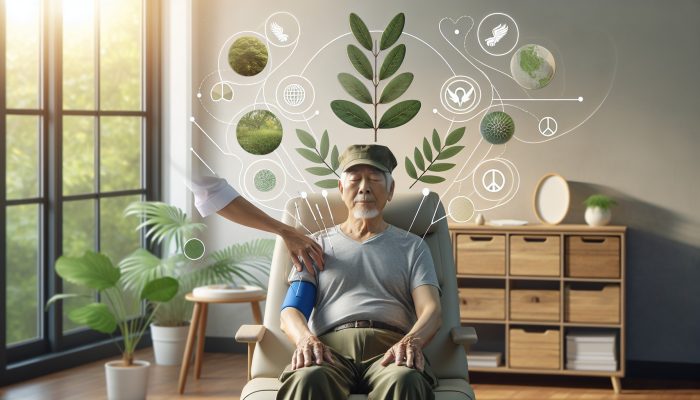Unveiling the Life-Changing Advantages of Acupuncture for Veterans
What Makes Acupuncture a Unique Healing Practice?

Acupuncture is a respected and ancient technique that holds a significant place in the realm of traditional Chinese medicine. This therapeutic art involves the precise insertion of fine needles into specific points on the body, aimed at restoring and balancing the flow of energy, commonly referred to as qi. Beyond merely alleviating pain, this age-old practice promotes holistic wellness by mobilizing the body’s innate healing abilities. The strategic placement of needles stimulates the nervous system, triggering a cascade of physiological responses that can yield substantial pain relief, improved circulation, and deep relaxation. For veterans, acupuncture emerges as a multifaceted solution for addressing the complex physical and emotional challenges that accompany service-related injuries and health concerns.
Acupuncture serves a purpose far beyond pain relief; it embodies a holistic therapeutic approach that recognizes the integral connection between physical ailments and mental health. Many veterans grapple with persistent issues such as chronic pain, anxiety, and various service-related conditions that significantly diminish their quality of life. In this context, acupuncture stands out as a non-invasive alternative or an effective complement to traditional treatments, empowering veterans to actively participate in their health journeys while nurturing a renewed sense of vitality and well-being.
Diving into the Fascinating History of Acupuncture in the UK
The history of acupuncture in the United Kingdom is both rich and captivating, with origins tracing back centuries. Its introduction to the UK can largely be attributed to a growing fascination with traditional Chinese medicine and its diverse health benefits. Over the years, acupuncture has adapted and evolved, harmoniously integrating ancient practices with modern scientific insights. By the mid-20th century, acupuncture began to gain acceptance in the UK as a reputable treatment, particularly in the domains of pain management and mental health therapy.
Recently, the National Health Service (NHS) has started incorporating acupuncture into its treatment offerings, recognizing its effectiveness in tackling a wide range of health issues, especially those pertinent to veterans. This integration has piqued the interest of not only healthcare professionals but also veteran communities, with many seeking alternative therapies to manage chronic pain and psychological challenges stemming from their military experiences. The historical progression towards acupuncture’s acceptance illustrates its increasing incorporation into mainstream healthcare systems, particularly for those who have selflessly served in the armed forces.
Why Acupuncture Is Essential for Supporting Veterans’ Health?
Acupuncture presents a wide array of benefits for veterans, particularly in the management of chronic pain, post-traumatic stress disorder (PTSD), and other health-related challenges linked to their military service. By activating the body’s inherent healing mechanisms, acupuncture fosters a comprehensive approach to health, leading to improved physical and mental health outcomes. Veterans who have embraced acupuncture frequently report significant enhancements in their overall quality of life, including diminished pain levels and improved emotional resilience.
One of the standout advantages of acupuncture lies in its ability to alleviate chronic pain conditions, which are all too common among veterans due to injuries sustained during their service. This therapy effectively engages specific acupuncture points correlated with pain pathways, providing relief from discomfort while also enhancing mobility. Moreover, acupuncture has been shown to stimulate the production of natural endorphins, the body’s intrinsic pain-relieving agents, thus offering a more organic method for pain management, free from the adverse side effects often associated with pharmaceuticals.
Additionally, acupuncture offers significant mental health benefits, serving as an effective complementary treatment for veterans grappling with anxiety, depression, and PTSD. The calming effects of acupuncture can profoundly assist veterans in managing their symptoms, paving the way for a recovery journey that avoids the side effects typically linked to conventional medications. This dual approach, addressing both physical and psychological health, makes acupuncture an appealing option for veterans seeking holistic care.
Examining Acupuncture’s Positive Influence on Veterans’ Mental Well-Being

Acupuncture plays an essential role in enhancing the mental health of veterans by addressing prevalent issues such as anxiety, depression, and stress. These psychological challenges are frequently reported among veterans and can be intensified by the trauma associated with their military service. The holistic nature of acupuncture provides a safe and non-invasive method to tackle these emotional hurdles, leading to a growing preference for veterans exploring alternative therapies.
The physiological effects of acupuncture markedly contribute to its mental health benefits. For example, the insertion of needles prompts the release of neurotransmitters and hormones that uplift mood and induce a sense of relaxation. Many veterans discover that consistent acupuncture sessions not only help manage their emotional responses but also cultivate a sense of tranquility and equilibrium in their lives. This is especially crucial for those who find it challenging to reintegrate into civilian life, where feelings of isolation from peers and support networks can be prevalent.
Furthermore, acupuncture enhances sleep quality, which is often disrupted due to anxiety or PTSD. Quality sleep is vital for mental health, and by addressing sleep disturbances, acupuncture aids veterans in tackling one of the primary sources of their emotional distress. In summary, acupuncture’s role in bolstering veterans’ mental health highlights the necessity for integrated, holistic healthcare approaches that cater to both the physical and psychological facets of well-being.
Expert Perspectives on the Benefits of Acupuncture for Veterans
Inspiring Real-Life Transformations Through Acupuncture Treatments
A myriad of veterans have shared their life-altering experiences stemming from acupuncture, exemplifying its efficacy across various treatment scenarios. The following case studies underscore successful acupuncture interventions, focusing on pain management and mental health support:
- Case Study 1: A veteran suffering from chronic back pain attributed to service-related injuries underwent multiple acupuncture sessions, ultimately achieving an impressive 70% reduction in pain after just six visits, enabling him to return to his cherished physical activities.
- Case Study 2: Another veteran battling PTSD found that consistent acupuncture treatments significantly diminished his anxiety and panic attacks, allowing him to engage more fully in social and family gatherings.
- Case Study 3: A veteran plagued by severe migraines began acupuncture therapy, resulting in a marked decrease in both the frequency and intensity of his headaches, enabling him to lessen his reliance on previously prescribed medications.
- Case Study 4: A female veteran dealing with depression discovered that acupuncture not only alleviated her physical discomfort but also provided substantial emotional relief, significantly enhancing her mood and overall outlook on life.
These examples highlight the potential of acupuncture to significantly improve health outcomes for veterans. By addressing both physical and mental health concerns, acupuncture empowers veterans to reclaim their lives and elevate their overall well-being.
What Lasting Benefits Can Veterans Anticipate from Acupuncture?

The long-term benefits of acupuncture for veterans are extensive, encompassing both physical and psychological dimensions of health. Regular acupuncture treatments can lead to sustained relief from chronic conditions, lessened reliance on medications, and an overall enhancement in quality of life. As veterans engage in ongoing acupuncture therapy, they frequently report a range of enduring advantages:
- Reduced dependence on pain medication: Many veterans find that acupuncture enables them to manage their pain effectively without resorting to opioids or other pharmaceuticals.
- Improved mental wellness: Prolonged acupuncture treatment can significantly alleviate symptoms of anxiety and depression, equipping veterans with the tools to maintain their mental health.
- Enhanced overall quality of life: Regular acupuncture sessions assist veterans in regaining mobility and functionality, empowering them to participate more fully in daily activities and social interactions.
- Increased resilience: Acupuncture fosters a heightened sense of control over one’s body and mind, empowering veterans to develop effective coping strategies for stress and trauma.
As these long-term benefits become apparent, veterans often experience a renewed sense of hope and empowerment in their healthcare journey. Acupuncture emerges as a vital resource, allowing them to take charge of their health and enhance their lives post-service.
Essential Guidelines for Veterans to Access Acupuncture Services
Accessing acupuncture services is crucial for veterans eager to harness its extensive benefits. There are several pathways available, and understanding how to navigate these options is essential for maximizing the advantages that acupuncture can provide:
- Consult with a General Practitioner: Veterans should initiate a discussion about their interest in acupuncture with their GP, who can offer referrals to NHS-accredited practitioners or alternative therapies.
- Investigate NHS offerings: Many NHS trusts are now incorporating acupuncture as part of their pain management and mental health services. Veterans can inquire about the availability of these services in their local area.
- Research private practitioners: Veterans can find qualified private acupuncturists through organizations such as the British Acupuncture Council, ensuring they select a trained and regulated professional.
- Engage with veterans’ charities: Several charities provide acupuncture services or funding for treatments, facilitating easier access for veterans to these essential therapies.
By adhering to these essential steps, veterans can adeptly navigate the healthcare landscape to locate and access acupuncture services tailored to their specific needs, allowing them to experience the extensive benefits that acupuncture can offer.
Exploring Various Acupuncture Techniques and Approaches
Which Techniques Are Employed in Acupuncture Practices?
Acupuncture utilizes a broad range of techniques, each specifically designed to address the individual needs and conditions of the patient. These methods optimize the therapeutic benefits of acupuncture, particularly for veterans facing distinct health challenges. Common techniques include:
- Needle insertion: The most traditional form of acupuncture, involving the careful placement of fine needles into designated points to stimulate energy flow.
- Electroacupuncture: This method incorporates a mild electrical current to the needles, enhancing pain relief and promoting muscle relaxation.
- Cupping: This technique employs suction cups placed on the skin to improve blood flow and relieve muscle tension, often utilized alongside acupuncture.
- Moxibustion: This technique involves applying heat generated by burning mugwort near acupoints to amplify the effects of needle insertion.
These techniques can be combined or tailored based on the specific requirements of veterans, ensuring a personalized treatment approach. The versatility of these methods allows practitioners to effectively address a wide array of conditions, from chronic pain to anxiety disorders, customized to each veteran’s unique health profile.
How Does Electroacupuncture Optimize Pain Management for Veterans?
Electroacupuncture is a specialized variation that employs mild electrical currents to enhance the therapeutic outcomes of needle insertion. This technique has proven especially advantageous for veterans, particularly in the realms of pain management and muscle relaxation. The application of small electrical impulses through the needles stimulates nerve endings more effectively than traditional acupuncture, yielding heightened analgesic effects.
Veterans experiencing chronic pain, especially those resulting from service-related injuries, often find substantial relief through electroacupuncture. Research indicates that the combination of needle insertion and electrical stimulation can lead to greater reductions in pain levels, enabling veterans to fully engage in their daily routines and activities.
Moreover, electroacupuncture promotes muscle relaxation, alleviating tension and discomfort often accompanying physical injuries. By facilitating the relaxation of tight muscles, veterans can experience improved mobility and an overall enhanced sense of well-being. The synergistic effects of this technique underscore its relevance for veterans seeking effective, non-invasive options for pain management and recovery.
Ensuring Safety and Regulation of Acupuncture Practices in the UK
The practice of acupuncture in the United Kingdom is governed by rigorous regulations and professional standards to guarantee the safety and effectiveness of treatments. This regulation is particularly crucial for veterans, who may be more vulnerable due to their health conditions. The British Acupuncture Council (BAcC) acts as a pivotal governing body, overseeing practitioners and ensuring they adhere to high standards of training and practice.
Acupuncturists are required to undergo extensive training, which typically includes a comprehensive understanding of anatomy, physiology, and the principles of traditional Chinese medicine. This thorough education equips practitioners with the necessary skills to safely and effectively treat a diverse array of conditions.
Additionally, stringent safety protocols are firmly established to minimize risks associated with acupuncture treatments. Practitioners must maintain sterile environments, utilize single-use needles, and follow rigorous infection control guidelines. This commitment to safety ensures that veterans can confidently access acupuncture services, knowing that their health and well-being are a top priority.
As the practice continues to gain popularity, ongoing research and professional development play a crucial role in upholding the highest standards. This dedication to safety and regulation enhances the credibility of acupuncture as a viable treatment option for veterans seeking to improve their health outcomes.
Understanding the Mechanisms Behind Acupuncture for Veterans
What Physiological Changes Are Induced by Acupuncture?
Acupuncture triggers a myriad of physiological responses in the body, leading to numerous health benefits, particularly for veterans dealing with chronic pain or mental health issues. The insertion of needles into targeted acupuncture points activates nerve endings, which can stimulate the release of endorphins and other natural pain-relieving chemicals. This process not only alleviates pain but also fosters a deep sense of relaxation and overall well-being.
A significant physiological impact of acupuncture is the activation of the body’s parasympathetic nervous system, responsible for the relaxation response. This activation can lower heart rates, reduce blood pressure, and cultivate an overall sense of calm. For veterans experiencing anxiety or PTSD, this is especially beneficial, as it counteracts the heightened stress response commonly associated with these conditions.
Moreover, acupuncture has been shown to enhance circulation by improving blood flow to various regions of the body. This increased circulation aids in healing injuries and contributes to overall health improvements. For veterans, this is particularly relevant, as many may contend with physical injuries or conditions stemming from their service. Overall, the physiological effects of acupuncture highlight its role as a holistic treatment option addressing both physical and mental health challenges.
How Can Acupuncture Assist in Managing PTSD Among Veterans?
Acupuncture is emerging as a valuable non-pharmacological treatment option for veterans grappling with post-traumatic stress disorder (PTSD). This therapy promotes relaxation and diminishes anxiety, both essential components in managing the symptoms associated with PTSD. By targeting specific acupuncture points, the treatment can help alleviate the emotional and psychological burdens that many veterans carry.
Research indicates that acupuncture can effectively reduce the severity of PTSD symptoms, such as nightmares, flashbacks, and heightened anxiety. The calming effects of the treatment contribute to an overall decrease in stress levels, allowing veterans to gain greater control over their emotional responses. This empowerment can facilitate their engagement in therapeutic processes aimed at recovery and healing.
Additionally, acupuncture can bolster overall mental resilience, equipping veterans with coping strategies to navigate stressors more effectively. As veterans participate in regular acupuncture sessions, they often report improvements in emotional regulation, making it easier to confront daily challenges. The safety and efficacy of acupuncture as a treatment for PTSD further underscore its significance in supporting the mental health of veterans.
What Is Acupuncture’s Role in Comprehensive Pain Management Strategies?
Acupuncture plays a pivotal role in comprehensive pain management, particularly for veterans experiencing chronic pain resulting from their service. By targeting specific acupuncture points linked to pain pathways, this treatment effectively alleviates discomfort and enhances overall quality of life. The holistic approach of acupuncture represents a departure from conventional pain management strategies that often heavily rely on medications.
The mechanism of acupuncture in pain management involves stimulating the body’s natural pain relief system. The insertion of needles triggers the release of endorphins and other neurochemicals that help diminish the perception of pain. For veterans, this translates to experiencing sustained relief from conditions such as back pain, joint pain, and headaches that commonly afflict those with service-related injuries.
Furthermore, acupuncture can enhance mobility and functionality by addressing underlying issues contributing to pain. By promoting the relaxation of tense muscles and improving blood circulation, veterans regain the ability to engage in physical activities that may have been previously limited due to pain. The role of acupuncture in pain management signifies a broader understanding of health, focusing on holistic solutions that empower veterans to reclaim control over their well-being.
Research-Driven Insights into Acupuncture Benefits for Veterans
Examining Recent Studies on Acupuncture’s Effectiveness
Recent studies have underscored the effectiveness of acupuncture as a treatment modality for veterans, particularly in pain management and enhancing mental health outcomes. The expanding body of evidence supports the integration of acupuncture into veterans’ healthcare strategies, demonstrating its ability to substantially reduce pain levels while improving psychological well-being.
One notable study focused on pain management among veterans suffering from chronic pain conditions, revealing that those who received acupuncture exhibited a significant decrease in pain intensity compared to control groups. Moreover, veterans reported improved functionality and overall quality of life following regular acupuncture sessions. This reinforces the notion that acupuncture can deliver sustainable pain relief without the adverse effects typically associated with conventional pain medications.
Additional investigations have examined the mental health benefits of acupuncture for veterans, particularly those experiencing PTSD. Findings indicate that acupuncture can lead to significant reductions in PTSD symptoms, providing a viable alternative to pharmacological treatments. These results highlight the potential for acupuncture to be incorporated into comprehensive treatment plans designed to address both physical and psychological health challenges faced by veterans.
What Do Current Findings Reveal About Acupuncture’s Impact on Veterans?
Evidence from various clinical trials and studies suggests that acupuncture can significantly enhance the quality of life for veterans, particularly those dealing with chronic pain and PTSD. The consistent findings across numerous studies reinforce acupuncture’s effectiveness as a complementary treatment option, augmenting traditional therapeutic approaches.
For veterans with chronic pain, acupuncture has been shown to decrease reliance on pain medication, promoting a more sustainable approach to pain management. This is especially pertinent for veterans, many of whom are cautious about the potential side effects and addiction risks associated with opioid medications. Additionally, the reported reductions in pain levels suggest that acupuncture can facilitate a return to an active and fulfilling lifestyle.
Furthermore, the evidence supporting acupuncture’s role in mental health, particularly for PTSD, underscores its potential as a non-invasive alternative to pharmaceutical interventions. By alleviating symptoms of anxiety and depression, acupuncture provides veterans with a pathway to enhance their emotional resilience and overall mental well-being. The accumulation of evidence advocates for the increased integration of acupuncture into veterans’ healthcare frameworks.
How Is Acupuncture Being Integrated into Veterans’ Healthcare Systems?
Acupuncture is progressively being incorporated into veterans’ healthcare plans, reflecting a growing recognition of its therapeutic potential. Many NHS trusts and veterans’ charities are now including acupuncture in their service offerings, ensuring that veterans can access this effective treatment modality. This shift towards integrative healthcare is essential in addressing the multifaceted needs of veterans, especially those grappling with chronic pain and mental health issues.
Veterans can obtain acupuncture through NHS pain clinics, where practitioners are trained to deliver evidence-based treatments tailored to individual needs. Additionally, as awareness of acupuncture’s benefits continues to rise, more private practitioners are emerging, providing veterans with a variety of options. This incorporation into mainstream healthcare not only validates the practice but also fosters an environment where veterans can pursue holistic approaches to their health.
Furthermore, partnerships between healthcare providers and veterans’ charities have led to the establishment of programs specifically focusing on delivering acupuncture services to veterans. Many charities offer funding for treatments, facilitating easier access for veterans to this invaluable therapy. The integration of acupuncture into veterans’ healthcare signifies a promising development, paving the way for improved health outcomes and a renewed sense of well-being for those who have served.
Accessing Acupuncture Services: A Comprehensive Guide for Veterans
What Options Are Available for Veterans Through the NHS for Acupuncture Services?
Veterans in the UK have a diverse array of options for accessing acupuncture services through the National Health Service (NHS). While availability may vary based on local resources and policies, numerous NHS trusts now incorporate acupuncture into their pain management and mental health services, underscoring the recognition of acupuncture’s potential benefits for veterans.
In many regions, NHS pain clinics offer acupuncture as part of a comprehensive pain management program. Veterans seeking acupuncture can consult their General Practitioners (GPs), who can provide referrals to appropriate NHS services. This pathway ensures that veterans receive care tailored to their specific needs, enhancing the likelihood of favorable health outcomes.
Additionally, some NHS mental health services now include acupuncture as an adjunct treatment for conditions such as PTSD and anxiety. These services aim to support veterans in managing their mental health effectively while acknowledging the importance of holistic therapies. By exploring NHS options, veterans can access regulated acupuncture services, reinforcing the commitment to their health and well-being.
How Can Veterans Locate Private Acupuncture Practitioners?
For veterans interested in finding private acupuncture practitioners, several resources are available to ensure they receive high-quality, regulated care. The British Acupuncture Council (BAcC) is a reputable organization that maintains a directory of qualified practitioners throughout the UK. Veterans can visit the BAcC website and search for practitioners based on their geographic location, ensuring they find someone with the necessary training and expertise.
It is advisable for veterans to seek acupuncturists registered with professional bodies, as this guarantees adherence to established practice standards. Many private practitioners also specialize in treating veterans, offering tailored approaches that address the unique health challenges faced by those who have served.
Moreover, veterans can consider reaching out to local veterans’ organizations and charities that may provide recommendations or assistance in finding accredited acupuncturists. By utilizing these resources, veterans can confidently pursue private acupuncture services that cater to their individual health requirements.
What Support Do Veterans’ Charities Offer for Acupuncture Access?
Many veterans’ charities in the UK recognize the significance of holistic health approaches, including acupuncture, in enhancing the well-being of veterans. These organizations frequently provide a variety of services aimed at improving veterans’ access to acupuncture and other complementary therapies.
One key way charities assist veterans is by providing funding for acupuncture treatments. Financial constraints can pose barriers for many veterans seeking necessary care, and several charities have programs designed to alleviate treatment costs. This support can be crucial in enabling veterans to explore acupuncture as a viable option for managing their health concerns.
Additionally, numerous veterans’ charities run programs that directly offer acupuncture services. These initiatives often target the specific needs of veterans, encompassing pain management and mental health support. By collaborating with trained acupuncturists, these charities ensure that veterans receive quality care in a supportive environment.
Moreover, charities frequently provide educational resources about the benefits of acupuncture, helping veterans understand how this holistic approach can contribute to their overall wellness. This commitment to facilitating veterans’ access to acupuncture underscores the vital role that community organizations play in promoting health and recovery.
How Can Veterans Access Acupuncture Services Through the Armed Forces Covenant?
The Armed Forces Covenant signifies a commitment from the government to ensure that individuals who serve, or have served, in the armed forces receive fair treatment and appropriate support across various facets of life, including healthcare. Veterans can access acupuncture services as part of the healthcare provisions outlined in the Covenant, which seeks to meet the unique needs of military personnel and their families.
Under the Covenant, veterans may be eligible for enhanced healthcare services, including complementary therapies like acupuncture. This facilitates veterans in seeking acupuncture treatments through NHS services or private practitioners, with additional support provided according to their individual circumstances. Understanding the provisions available under the Covenant empowers veterans to access the care they need.
Moreover, veterans can engage in discussions with their GP or local healthcare providers to assist in navigating the options available through the Armed Forces Covenant. This collaborative approach ensures that veterans are informed of their rights and entitlements, enabling them to make educated decisions about their health.
The incorporation of acupuncture into the healthcare provisions of the Armed Forces Covenant exemplifies a commitment to the holistic well-being of veterans, acknowledging the significance of alternative therapies in their recovery journey.
The Future of Acupuncture for Veterans in the UK
What Emerging Trends Are Shaping the Future of Acupuncture for Veterans?
The future of acupuncture for veterans in the UK looks promising, with several emerging trends poised to enhance accessibility to this beneficial therapy. One notable trend is the increasing integration of acupuncture into NHS services, reflecting a growing acknowledgment of its value in addressing the unique health challenges faced by veterans. As more healthcare providers begin to recognize acupuncture’s effectiveness, a broader incorporation of this practice into treatment plans is anticipated.
Another trend gaining momentum is the rise in research funding dedicated to exploring the benefits of acupuncture specifically for veterans. As healthcare organizations and academic institutions recognize the potential of acupuncture to enhance health outcomes, more studies are likely to emerge. This research will help solidify the evidence base for acupuncture and its role in veterans’ healthcare, ultimately leading to more informed treatment options.
Additionally, there is a growing recognition of the necessity for holistic healthcare approaches that encompass both physical and mental health. This shift in perspective drives demand for complementary therapies like acupuncture, which provide veterans with valuable resources for managing chronic pain and mental health challenges. The trend toward integrative healthcare signifies a move away from solely pharmacological interventions, favoring a more comprehensive approach to well-being.
How Is Technology Improving Acupuncture Accessibility for Veterans?
Technology is increasingly playing a significant role in enhancing acupuncture treatments for veterans, making them more accessible and effective. Telehealth services have emerged as a vital resource, enabling veterans to consult with qualified acupuncturists remotely. This flexibility can be particularly beneficial for those living in remote areas or those with mobility challenges, ensuring they can access care without facing substantial barriers.
Moreover, advancements in acupuncture techniques are being supported by technology, including the use of electronic stimulation devices that can amplify the effects of traditional needle insertion. These devices enable practitioners to deliver more precise and effective treatments, tailoring approaches to meet the specific needs of veterans.
Virtual reality (VR) technology is also being explored as a complementary tool in acupuncture and pain management. Techniques that integrate VR can help create a calming environment for veterans during treatments, potentially enhancing relaxation and therapeutic results. As technology continues to evolve, its incorporation into acupuncture practices is likely to improve access and effectiveness for veterans seeking this holistic therapy.
What Policy Changes Could Enhance Access to Acupuncture for Veterans?
Several policy changes could significantly improve the accessibility and integration of acupuncture services for veterans in the UK. One potential change is to increase funding for acupuncture research, which would facilitate more comprehensive studies validating its benefits specifically for veterans. By investing in research, policymakers can help build a stronger evidence base for acupuncture, leading to greater acceptance within healthcare systems.
Furthermore, better integration of acupuncture into veterans’ healthcare plans could ensure that veterans have access to these services as part of their standard treatment options. Policymakers could advocate for the inclusion of acupuncture in guidelines for pain management and mental health treatment for veterans, promoting a more holistic approach to care.
Increased training opportunities for healthcare professionals in acupuncture could also benefit veterans. By ensuring that more practitioners are equipped to offer acupuncture services, veterans would gain greater access to qualified care, improving health outcomes across the board. These policy changes could pave the way for a brighter future for acupuncture as a vital component of veterans’ healthcare in the UK.
Frequently Asked Questions About Acupuncture’s Benefits for Veterans
Which Conditions Can Acupuncture Effectively Address for Veterans?
Acupuncture possesses the potential to effectively address a variety of conditions faced by veterans, such as chronic pain, PTSD, anxiety, depression, and insomnia, thereby promoting overall wellness and recovery.
What Is the Recommended Frequency of Acupuncture Treatments for Veterans?
The frequency of acupuncture treatments can vary based on individual needs, but many veterans find it beneficial to attend weekly or bi-weekly sessions, gradually adjusting as they notice improvements in their condition.
Is Acupuncture Safe for Veterans?
Yes, acupuncture is widely regarded as safe for veterans when performed by qualified practitioners. Strict regulations ensure that practitioners adhere to high standards of hygiene and safety, minimizing the risk of complications.
Can Veterans Access Acupuncture Services Through the NHS?
Yes, numerous NHS trusts offer acupuncture as part of their pain management and mental health services. Veterans can access these services through their General Practitioners, facilitating a pathway to holistic care.
Is a Referral Required for Veterans to See an Acupuncturist?
While a referral from a General Practitioner can be advantageous, especially for NHS services, many private acupuncturists allow veterans to self-refer, providing more flexibility in accessing care.
What Can Veterans Expect During an Acupuncture Session?
During an acupuncture session, veterans can anticipate a thorough assessment followed by the insertion of fine needles into specific points on the body. The experience is generally relaxing, with many reporting reduced pain and stress levels following treatment.
How Long Does a Typical Acupuncture Treatment Session Last?
An acupuncture session typically lasts between 30 minutes to an hour, depending on the treatment plan and the individual needs of the veteran receiving care.
Are There Any Side Effects Associated with Acupuncture?
Most veterans experience minimal side effects, such as slight soreness at the needle insertion sites. Serious side effects are rare when acupuncture is performed by qualified practitioners adhering to safety protocols.
Can Acupuncture Be Effectively Combined with Other Treatments?
Absolutely, acupuncture can be effectively combined with other treatments, including physical therapy and medication, to enhance overall health outcomes for veterans, creating a comprehensive care strategy.
How Can Veterans Locate Qualified Acupuncturists?
Veterans can find qualified acupuncturists through the British Acupuncture Council’s directory or by seeking recommendations from healthcare providers and veterans’ organizations, ensuring they receive quality care tailored to their needs.
Connect with us on Facebook for more information!
The Article Acupuncture for Veterans’ Benefits: Enhancing Health and Wellbeing Was First Published On https://acupuncture-frome.co.uk
The Article Acupuncture for Veterans: Boosting Health and Wellbeing Was Found On https://limitsofstrategy.com

